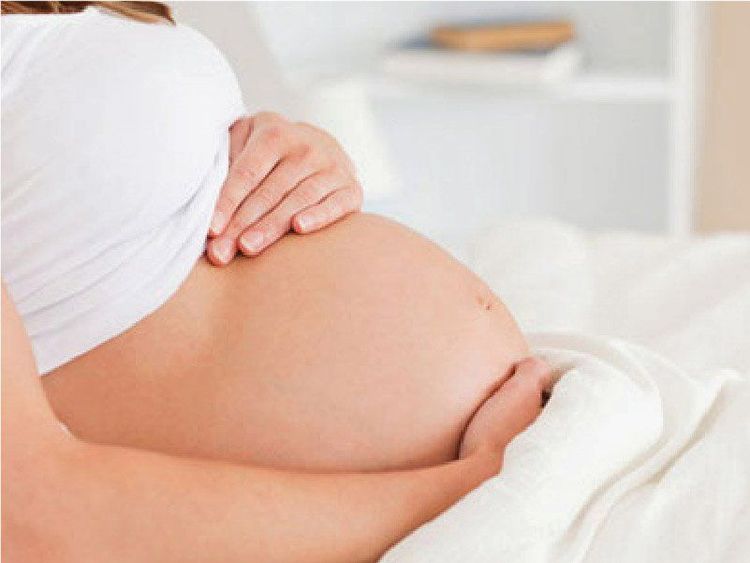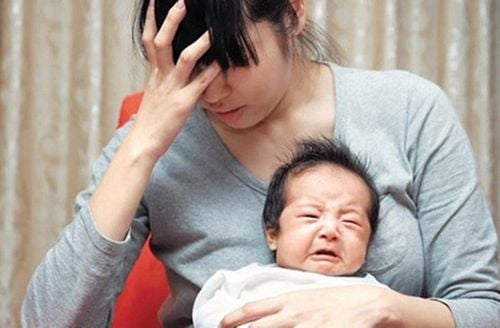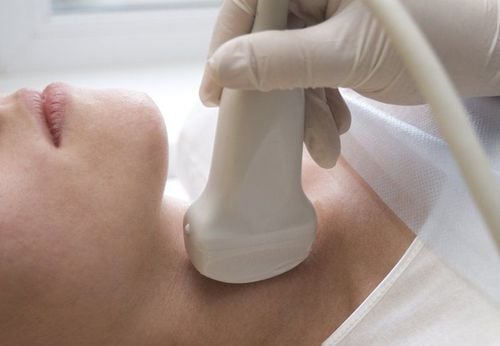This is an automatically translated article.
The article was professionally consulted by Doctor Department of Obstetrics and Gynecology - Vinmec Hai Phong International General Hospital.
Postpartum thyroiditis is a thyroid disorder in women. This is an inflammatory process of the thyroid gland that occurs in the first year after a woman gives birth without any signs of thyroid disease before. In fact, this disease is not uncommon, but it is easy to confuse it with stress or postpartum psychosis.
1. What is postpartum thyroiditis?
The thyroid is a small gland in the front of the neck that makes thyroid hormone. These hormones travel through blood vessels to different parts of the body. Thyroid hormone helps control the body's use of energy. They affect almost every organ in the body. When the thyroid gland produces the wrong amount of hormones, health problems occur.
Postpartum thyroiditis is an inflammatory process of the thyroid gland that occurs in the first year after a mother gives birth without any signs of thyroid disease before.
Women with postpartum thyroiditis often last several weeks, even months. However, postpartum thyroiditis can be difficult to recognize because the symptoms and signs of the disease are often mistaken for stress and postpartum mood disorders.
Most women with postpartum thyroiditis return to normal thyroid function. But for some people, the disease can develop into permanent complications.

2. Causes of postpartum thyroiditis
The exact cause of postpartum thyroiditis is currently unknown. However, women with postpartum thyroiditis often have high levels of anti-thyroid antibodies during early pregnancy and after childbirth.
Thus, this is evidence that mothers with postpartum thyroiditis may have an underlying autoimmune thyroid condition that flares up due to fluctuations in immune function. This underlying condition has a lot in common with Hashimoto's thyroiditis—the immune system attacks the thyroid gland.
Some risk factors for postpartum thyroiditis are as follows:
Autoimmune disorders, such as type 1 diabetes History of postpartum thyroiditis High levels of anti-thyroid antibodies History have had previous thyroid problems Family history of thyroid problems Some research to find out the causes and risk factors for postpartum thyroiditis is needed set. In addition, there have been several studies that have demonstrated a relationship between postpartum thyroiditis and postpartum depression. Therefore, if you have postpartum depression, you should see your doctor to be checked for abnormal thyroid activity.

3. Symptoms of postpartum thyroiditis
In postpartum thyroiditis, a person may go through two stages:
Inflammation and thyroid hormone release can first cause mild signs and symptoms similar to an overactive thyroid ( hyperthyroidism), including: anxiety, irritability, fast heartbeat or palpitations, unexplained weight loss, increased sensitivity to heat, fatigue, tremors, insomnia. These signs and symptoms usually occur about 1 to 4 months postpartum and last 1 to 3 months. In the next stage, the patient can make a full recovery or the thyroid gland will be destroyed. The damaged thyroid gland becomes underactive. This condition can also go away or be permanent for life (to fix this, hormone replacement is needed). When thyroid cells become depleted, mild signs and symptoms of an underactive thyroid gland (hypothyroidism) may develop, including: lack of energy, increased sensitivity to cold, constipation, dry skin, weight gain, feelings of depression. These signs and symptoms usually begin 4 to 6 months after the symptoms of hyperthyroidism resolve and can last up to 12 months. However, some women with postpartum thyroiditis develop symptoms of only hyperthyroidism or hypothyroidism.

4. Complications of postpartum thyroiditis
For most women with postpartum thyroiditis, thyroid function eventually returns to normal. Duration is usually within 12 to 18 months of the onset of symptoms. However, some women with postpartum thyroiditis do not recover from the hypothyroid phase. In this case, hypothyroidism develops, where the thyroid gland does not produce enough of the important hormones for the organs to function.
5. Postpartum thyroiditis prevention
While postpartum thyroiditis can't be prevented, pregnant women can take some steps to take care of themselves in the months after giving birth to prevent it, such as: eating right, often Regular exercise improves health, ensures proper sleep and rest... If you have any unusual signs or symptoms after childbirth, don't think they're related to the stress of caring for a baby. Infant. You should see a doctor for timely examination and advice to help find a treatment method to avoid the condition from becoming severe and causing serious complications affecting health.
Vinmec International General Hospital is the address for examination, treatment and prevention of diseases, including the specialties of Obstetrics and Gynecology, Endocrinology,... When performing the examination process at Vinmec, customers will be welcomed and used facilities, modern machinery system accompanied by perfect medical services under the guidance and advice of good doctors, well-trained in both internal and external areas. foreign.
Customers can directly go to Vinmec Health system nationwide to visit or contact the hotline here for support.
References: mayoclinic.org, hopkinsmedicine.org













